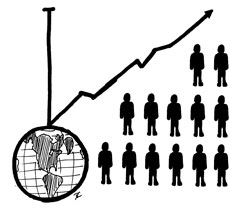Opinion: Overpopulation

Online Poster
December 3, 2004
There seems to have been some misunderstanding concerning my previous column on abortion, in which I discuss the issue of overpopulation.
To set the record straight, my intent was to ask anti-abortionists three questions: 1) Can the adoption market and the environment absorb an additional 1.4 million unwanted births each year? 2) Since banning abortion will cause a surge in welfare, how can this be reconciled with the conservative view that opposes welfare? 3) Why would conservatives wish to deny rights to same-sex couples when banning abortion would oversaturate the adoption market and create higher demand for adopting families? Instead of receiving any constructive dialogue on these topics, I was accused of promoting genocide and a eugenic agenda geared at population reduction.
Let me state definitively that I do not view abortion as a method of population control. I simply don’t want our current population problem exacerbated through the banning of the procedure, especially when few anti-abortionists have grappled with the full gamut of social, economic and environmental consequences.
The issue of overpopulation is completely separate, rife with complex moral dilemmas. I realize that many people, particularly conservatives, do not see overpopulation as a problem. They often point out advances in agricultural biotechnology – explaining that it feeds more people every year. However, these views are largely misinformed and out-of-touch with some basic facts.
More than 200 years ago, Thomas Malthus pointed out that food resources are finite. He went on to argue mathematically that exponential population growth will lead inevitably to mass starvation and death. Although his original predictions could not anticipate the explosion in food production due to modern technology, his observations on exponential growth illustrated how our population could quickly outpace our agricultural developments and eventually overwhelm the biocapacity of our planet.
Get The Daily Illini in your inbox!
Consider that the total population on this planet is 6.5 billion and is doubling about every 50 years. If the current rate of growth (1.4 percent) were to remain steady, there would be 13 billion people by 2055; 26 billion by 2105; 52 billion by 2155; and so on.
In reality, there is a huge discrepancy between growth rates of developed nations and developing nations. The populations of developing nations are doubling every 35 years, while the populations of developed nations are doubling at a slower rate.
There also is a negative correlation between population density and standards of living. Each nation has the right to decide between a high population with low standards of living or a low population with high standards of living. Immigration, however, can upset this balance, particularly when countries with high population density relieve their surplus populations onto counties with low population density. Immigration must be regulated for this reason.
In regards to developed nations – and particularly in the United States – wasteful consumption of the world’s resources results in pollution, habitat destruction and mass extinction. Even if our population growth is 1 percent (doubling about every 70 years), increasingly larger populations only intensify these problems, which have already reached epidemic proportions.
Simply curbing population growth might not be enough. Our current resource utilization is largely wasteful, and pollution levels grow with our consumption. Some visionaries have argued that our entire economy is unsustainable. Even if our growth rate flattened out immediately, our current population would only exhaust our non-renewable resources and our world’s ecosystems would continue to collapse.
The sad truth is that there is no easy solution to the overpopulation pandemic. Any approach geared toward decreasing our population, let alone curbing our growth rate to nothing, would require horrific policy changes and serious moral dilemmas.
Unfortunately, if we don’t rise to the challenge – and soon – the laws of nature will assume the responsibility for us with brutality. The longer we wait to act, the worse our fate will be.
Alex Dunkel is a University employee. His column runs alternate Fridays. He can be reached at [email protected].






